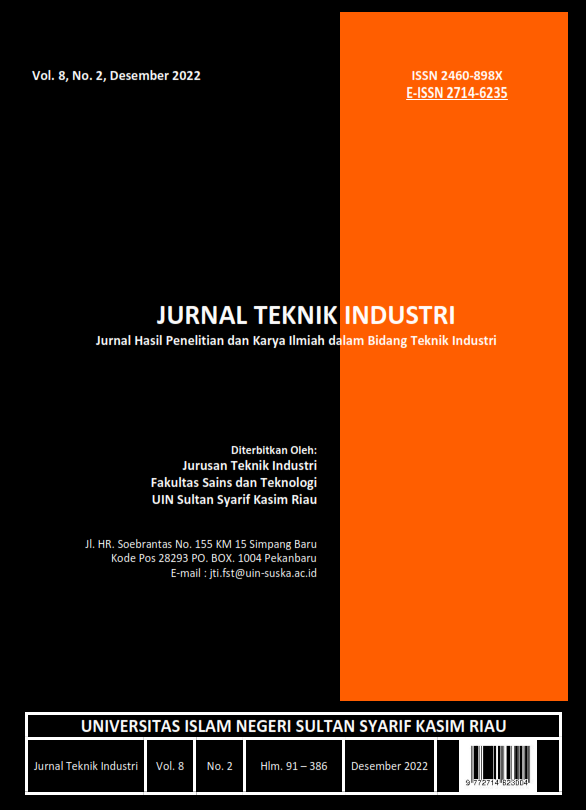Analisis Feasibilitas Penerapan Crowdshipping: Studi Kasus Kota Surabaya
DOI:
https://doi.org/10.24014/jti.v8i2.19743Abstract
Urbanisasi sudah menjadi budaya di seluruh dunia, tak terkecuali di Indonesia. Urbanisasi berdampak pada beberapa aktivitas perkotaan, salah satunya aktivitas logistik. Urbanisasi tanpa adanya upaya efisiensi pada aktivitas logistik akan berdampak pada peningkatan kepadatan lalu lintas dan berujung pada kemacetan. Salah satu solusi untuk kasus ini adalah crowdshipping. Crowdshipping melibatkan orangorang yang sedang melakukan perjalanan untuk merangkap sebagai kurir pengiriman barang. Sudah banyak penelitian terkait crowdshipping, namun di indoensia masih belum ada yang meneliti terkait konsep ini. Penelitian ditujukan untuk menganalisis feasibilitas penerapan crowdshipping di Indonesia, kususnya Surabaya. Terdapat dua sudut pandang feasibilitas dalam penelitian ini yaitu, biaya serta suplai dan demand. Kuesioner digunakan sebagai media untuk mengumpulkan data yang mendukung analissii tersebut. Uji-t berpasangan digunakan untuk menarik kesimpulan dari data yang dikumpulkan terkait feasibilitas penerapan crowdshipping. Hasil analisis menunjukkan bahwa dari segi biaya maupun suplai dan demand, crowdshipping mungkin untuk dilakukan di Kota Surabaya.References
Allahviranloo, M., Baghestani, A. (2019). A Dynamic Crowdshipping Model and Daily Travel Behaviour. Transportation Research Part E, 128, 175-190.
Boysen, N., Emde, S., Schewedfeger, S. (2022). Crowdshipping by Employees of Distribution Centers: Optimization Approaches for Matching Supply and Demand. European Journal of Operational Research, 296, 539-556.
Boysen, N., Fedtke, S. & Schwerdfeger, S. (2021). Last-mile delivery concepts: a survey from an operational research perspective. OR Spectrum 43, 1–58.
Braga, I. P. C., Dantas, H. F. B., Leal, M. R. D., Almeida, M. R., & Santos, E. M. (2019). Urban mobility performance indicators: a bibliometric analysis. Gestão & Produção, 26(3), e3828.
H, Chourabi et al., Understanding smart cities: An integrative framework. Proc. Annu. Hawaii Int. Conf. Syst. Sci., no. July 2014, pp. 2289–2297, 2012.
Han, L., Zhou, W., Li, W., Li, L. (2014). Impact of urbanization level on urban air quality: A case of fine particles (PM2.5) in Chinese cities. Environmental Pollution, 194, pp. 163-170.
Karakikes, I., Nathanail, E., Adamos, G., Karatsoli, M., Social media users as carriers into the last mile delivery. In Proceedings of the hEART 2018: 7th Symposium of the European Association for Research in Transportation, Athens, Greece, 5–7 September 2018.
Kauf S. (2016). City logistics - a strategic element of sustainable urban development. Transportation Research Procedia, 16, pp. 158-164.
Mckinnon, A. (2016). Crowdshipping: a Communal Approach to Reducing Urban Traffic Levels?. Research Gate.
Miranda, H. F., & Silva, A. N. R. (2012). Benchmarking sustainable urban mobility: the case of Curitiba, Brazil. Transport Policy, 21, 141-151.
OECD, OECD (2012), OECD Environmental Outlook to 2050, OECD Publishing. 2012.
Oliveira, A.H.S., Savelsbergh, M.W.P., Veelenturf, L.P., van Woensel, T. (2019). Chapter 15—Crowd-Based City Logistics. In Sustainable Transportation and Smart Logistics, Faulin, J., Grasman, S.E., Juan, A.A., Hirsch, P., Eds., Elsevier: Amsterdam, The Netherlands.
Paloheimo, H., Lettenmeier, M., Waris, H. (2015). Transport reduction by crowdsourced deliveries—A library case in Finland. Journal Clean Production, 132, 240–251.
Pourrahmi, E., Jaller, M. (2021). Crowdshipping in Last Mile Deliveries: Operational Challenges and Research Opportunity. Socio-Economic Planning Sciences, 78.
Punel, A., Ermagun, A., Stathopoulos, A. (2019). Push and Pull Factors in Adopting a Crowdsourced Delivery System. Transp. Res. Rec, 2673, 529–540.
Taniguchi E., Thompson R.G., Qureshi A.G. (2020). Modelling city logistics using recent innovative technologies. City Logistics, 46, pp. 3-12.
Wicaksono, S., Lin, X., Tavasszy, L.A. (2021). Market potential of bicycle crowdshipping: A two-sided acceptance analysis. Research in Transportation Business & Management.
Zehtabian, S., Larsen, C., & Wøhlk, S. (2022). Estimation of the arrival time of deliveries by occasional drivers in a crowd-shipping setting. European Journal of Operational Research.
Downloads
Published
Issue
Section
License
Authors who publish with Jurnal Teknik Industri: Jurnal Hasil Penelitian dan Karya Ilmiah dalam Bidang Teknik Industri agree to the following terms:
1. Authors retain copyright and grant the journal right of first publication with the work simultaneously licensed under a Creative Commons Attribution-NonCommercial-ShareAlike 4.0 International License (CC BY-NC-SA 4.0) that allows others to share the work with an acknowledgment of the work's authorship and initial publication in this journal.
2. Authors are able to enter into separate, additional contractual arrangements for the non-exclusive distribution of the journal's published version of the work (e.g., post it to an institutional repository or publish it in a book), with an acknowledgment of its initial publication in this journal.
3. Authors are permitted and encouraged to post their work online (e.g., in institutional repositories or on their website) prior to and during the submission process, as it can lead to productive exchanges, as well as earlier and greater citation of published work (See The Effect of Open Access).
